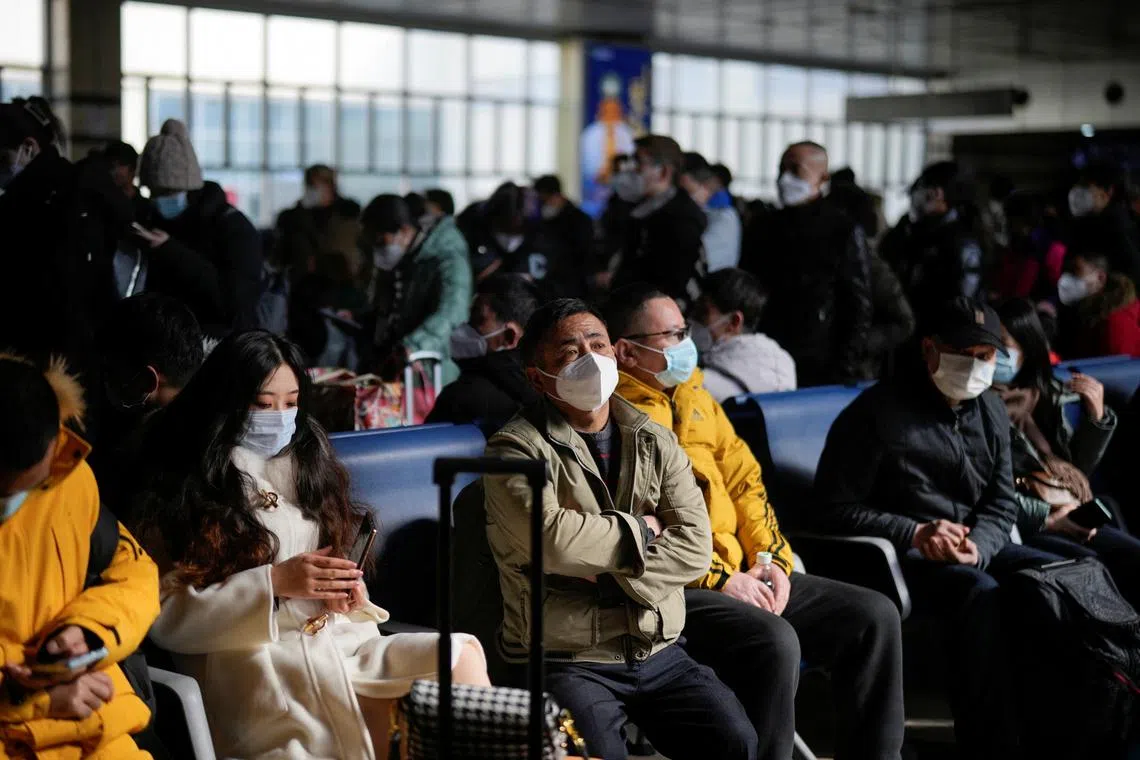CNY travel in China offers spark of economic rebound from Covid-19 crunch
Sign up now: Get ST's newsletters delivered to your inbox

People waiting to board a train at a railway station during the annual Spring Festival travel rush in Shanghai on Jan 16, 2023.
PHOTO: REUTERS
Follow topic:
SHANGHAI - Urban workers crowded train stations across China’s largest cities on Tuesday as the country’s mass migration for Chinese New Year holidays hit high gear, an early sign of economic recovery as officials confirmed a historic plunge due to Covid-19 curbs.
The world’s second-largest economy slowed sharply in the fourth quarter,
With mass travel for the Chinese New Year possible
While many analysts say a return to economic normality will be gradual as the impact of Covid-19 weakens, some see the Chinese New Year as a welcome early consumption boost.
“Peak infections passed in major cities in January, and with the Spring Festival coming, tourism is back, and the signs of a recovery in consumption are obvious,” said Shanghai-based economist Nie Wen at the investment firm Hwabao Trust.
But even as workers move out of the major cities, health experts fear a broadening and deepening of its Covid-19 outbreak, leaving the elderly in rural villages particularly vulnerable.
Despite Chinese authorities confirming a huge increase in deaths on Saturday - announcing that nearly 60,000 people with Covid-19 had died
The WHO earlier welcomed Saturday’s announcement after last week warning that China was heavily under-reporting deaths from the virus.
Specifically, the UN agency wants information on so-called excess mortality - the number of all deaths beyond the norm during a crisis, the WHO said.
“This is especially important during periods of surges when the health system is severely constrained,” it said on Monday.
The WHO added that it would continue working with China to provide advice and support, but had not yet fixed another formal meeting with Chinese officials after WHO Director-General Tedros Adhanom Ghebreyesus spoke with Dr Ma Xiaowei, director of China’s National Health Commission, at the weekend.
The Ministry of Transport has estimated that the Spring travel rush will see a total of 2.1 billion passenger trips nationwide between Jan 7 and Feb 15 as many Chinese city dwellers make the most of their first chance
Chinese officials jettisoned Beijing’s “zero-Covid” policy - an approach previously championed by ruling Communist Party leader Xi Jinping - in early December, letting the virus run unchecked across its population of 1.4 billion people.
State media reported that some 390,000 passengers were expected to travel from Shanghai train stations on Tuesday alone for what is known as the Spring Festival holiday - seen as the world’s largest annual mass migration before the pandemic.
As travellers moved through stations in Shanghai, China’s largest city, some expressed optimism despite the risks.
“I am not worried about the virus. Because we are young, our immunity is okay,” 37-year-old migrant worker Zhou Ning told Reuters outside the Shanghai Railway Station as he prepared to head back to his home area in Bazhong in the northeastern province of Sichuan.
“Back in my hometown, there are many people who have tested positive, but I am not worried about it.”
On a train leaving Shanghai, fellow migrant worker Feng Hongwei, 21, said he was “so happy, so excited” as he began a trek home to Puyang, Henan. “I haven’t seen my parents in two years”.
The holiday season has also sparked a revival in domestic air travel
International air links are also recovering. Emirates Airlines on Monday became the latest carrier to announce it would resume services from its Dubai hub to Shanghai this week, and would operate daily flights to Shanghai and Beijing from March. REUTERS

